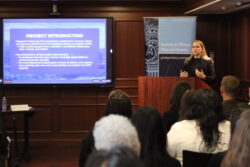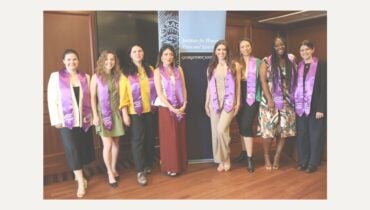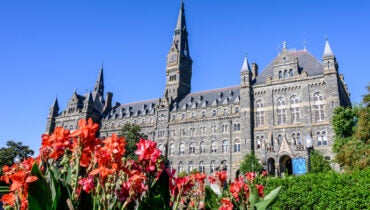The Hillary Rodham Clinton (HRC) Research Fellowship is a one-year program that provides unique opportunities for a recent Georgetown University master’s or PhD level graduate to conduct rigorous, policy-oriented research to address key knowledge gaps in the field of women, peace and security for the Georgetown Institute for Women, Peace and Security (GIWPS).
Kristine Baekgaard is the 2023-2024 HRC Fellow. She earned her Master’s in Security Studies from Georgetown University in May 2023 and holds a Bachelor of Science in International Relations from the London School of Economics. Kristine has previously worked at the Embassy of Denmark in the United States, and for various UK-based non-profits working on social justice.
We asked Kristine a few questions about her year as a Fellow, what it has been like to work on issues of women, peace and security, and who should apply for the 2024-2025 HRC Fellowship.
What initially drew you to the field of women, peace and security and to GIWPS specifically?
I have a vivid memory of reading Cynthia Enloe’s “Bananas, Beaches, and Bases” the summer before I started my undergraduate degree and thinking: these are the questions I want to be asking, these are the questions that matter. Throughout my undergraduate program, I continued to dive into the field. Throughout my undergraduate program, the more I learned about the study of gender equality at the intersection of peace and security, the more passionate I became about the topic. GIWPS was a big part of my decision to apply to and eventually choose Georgetown for my master’s program. Having been immersed primarily in the academic world of gender and security, I was eager to join an institution that focuses on translating research into tangible improvements for women around the world.
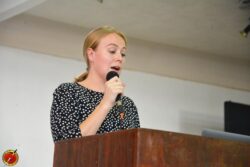
Why do you think the topic of women, peace and security (WPS) matters?
There are a few reasons why WPS is so important as an area of research and policy. First, women and gender-diverse people’s experiences of peace and conflict matter. We should, without qualification, care about the safety, wellbeing, and security of all people in conflict (and non-conflict) contexts, and work to achieve equality, justice, and flourishing for all. Beyond that, WPS and gender equality matter for global stability and security. As the Women, Peace and Security Index by GIWPS shows, gender equality is a stronger indicator of a country’s fragility, level of democracy, and resilience against climate change than overall GDP. All of this speaks to the importance of empowering diverse voices, particularly in conversations on peace and conflict.
What research have you been working on for the past year?
Over the last year, I have worked on two major projects. At the beginning of my fellowship I was wrapping up a project on masculinities and peacebuilding that I supported as a research assistant for two years during my master’s program. The project explored how to engage with men and boys as allies in achieving gender equality, and how to address and change narratives of masculinity that are used to justify gender inequality, violence against women, and participation in armed conflict. Now, I am working on the issue of technology-facilitated gender-based violence (TFGBV), which is increasingly a challenge the world of WPS needs to grapple with. In light of the many elections happening in 2024, as well as ongoing conflicts around the world—it is crucial to understand and address how technology can amplify and exacerbate gender-based violence, and discourage participation in peace, politics, and activism broadly. It has been fascinating to dig into this topic, and to think about how WPS tools and programs can and must engage with digital violence.
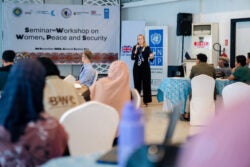
Are there any experiences from your fellowship that particularly stand out to you?
One of the most special experiences I have had during my fellowship was briefing a working group for the Danish National Action Plan on WPS on my TFGBV research. This experience was of deep personal significance, as I am a proud Danish-American dual citizen. I was honored to be able to contribute to one of my government’s conversations on an issue I am deeply passionate about. It was amazing to know that my research could possibly help inform tangible policy outcomes, and help shape and improve how, at least one country, works on WPS. I think this experience highlights the unique role that GIWPS serves, connecting research and policy in a very direct way.
Who should apply for the HRC Fellowship?
I would recommend the HRC Fellowship for anyone who is passionate about women’s empowerment and peace and security—and particularly for those who are interested in learning about how to formulate rigorous research for a policy audience. The lack of translation between academia and policy spaces is a significant challenge in many fields, and WPS is no exception. It is invaluable to learn how to communicate between these two audiences to maximize knowledge sharing and the impact of the work that is being done.
